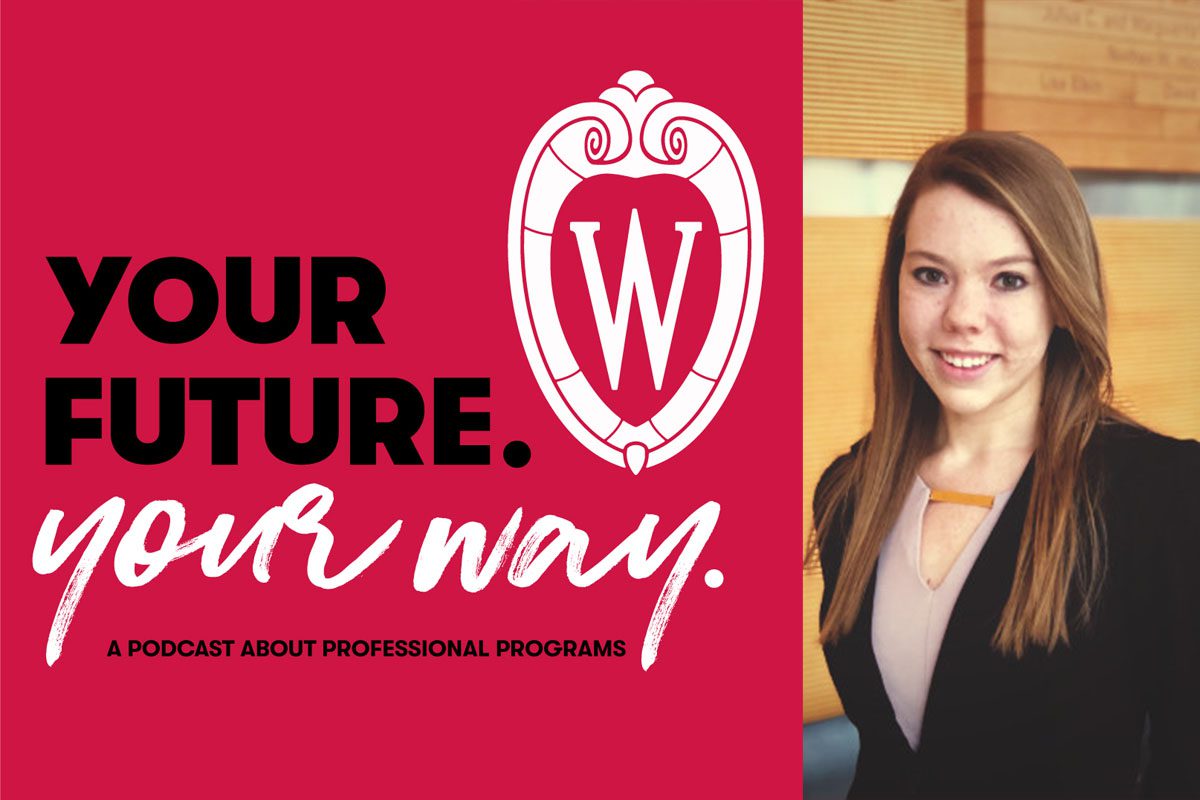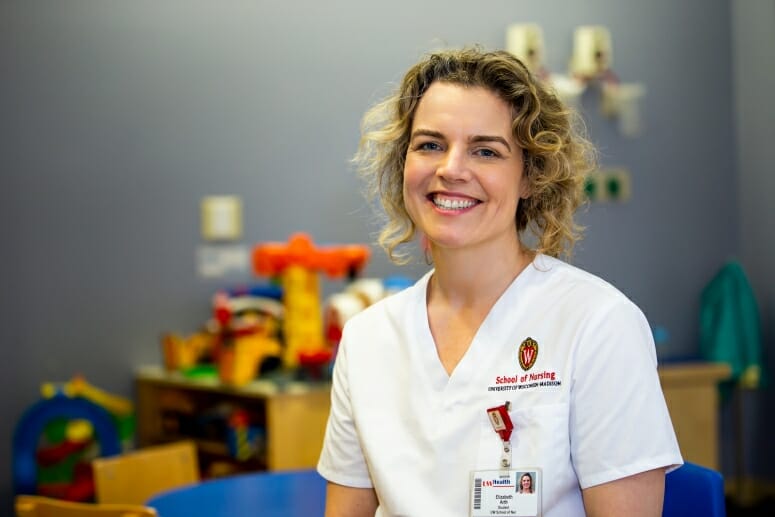Doctor of Nursing Practice
Doctor of Nursing Practice

Develop your clinical expertise, leadership skills, and systems thinking to improve patient and population health outcomes.
Is this program right for you?
The University of Wisconsin-Madison’s Doctor of Nursing Practice (DNP) is a unique program that trains post-bachelor’s and post-master’s students to specialize in a nursing practice of their choice. Our program is designed to develop students’ clinical expertise and expand their job prospects through a combination of coursework, clinical hours, and scholarly projects.
With a blend of online and in-person classes, students will have the convenience of online courses with the benefits of being on-campus and meeting in-person with faculty and staff. Our program offers three and four year options for post-bachelor’s students and has a specialty track for post-master’s students who have or are eligible to be certified as advanced practice nurses.
Our program also arranges clinical placements for our students. Post-bachelor’s students must complete a minimum of 1000 practicum hours divided into 500 hours of clinical practice and 500 hours of clinical leadership. Post-master’s students must complete a minimum of 500 hours of clinical leadership. Students may be able to request to complete their clinical closer to their residences, provided the site meets UW–Madison’s requirements.
Upon completing UW–Madison’s DNP program, students will be able to pursue a variety of careers in the healthcare field. Graduates of our program have continued to take on positions in the state of Wisconsin and across the country. Many alumni have gone on to become nurse practitioners, clinical nurse specialists, clinical faculty, program directors, nurse managers, and more.
Is this program right for you?
The University of Wisconsin-Madison’s Doctor of Nursing Practice (DNP) is a unique program that trains post-bachelor’s and post-master’s students to specialize in a nursing practice of their choice. Our program is designed to develop students’ clinical expertise and expand their job prospects through a combination of coursework, clinical hours, and scholarly projects.
With a blend of online and in-person classes, students will have the convenience of online courses with the benefits of being on-campus and meeting in-person with faculty and staff. Our program offers three and four year options for post-bachelor’s students and has a specialty track for post-master’s students who have or are eligible to be certified as advanced practice nurses.
Our program also arranges clinical placements for our students. Post-bachelor’s students must complete a minimum of 1000 practicum hours divided into 500 hours of clinical practice and 500 hours of clinical leadership. Post-master’s students must complete a minimum of 500 hours of clinical leadership. Students may be able to request to complete their clinical closer to their residences, provided the site meets UW–Madison’s requirements.
Upon completing UW–Madison’s DNP program, students will be able to pursue a variety of careers in the healthcare field. Graduates of our program have continued to take on positions in the state of Wisconsin and across the country. Many alumni have gone on to become nurse practitioners, clinical nurse specialists, clinical faculty, program directors, nurse managers, and more.
Admissions requirements
Post-bachelor’s applicants must:
- Have a bachelor’s degree in nursing from an accredited institution. Applicants who have a non-APN master’s degree (i.e. nurse education) are considered post-bachelor’s applicants and are able to waive up to 18 credits based on previous graduate coursework, pending review of syllabi.
- GPA of 3.0 on the last 60 credits for the baccalaureate degree
- RN license
- One year of professional nursing experience
- Grade of B or better in a graduate level statistics course within the last 5 years. (Note: The course does not need to be taken before applying, but must be successfully completed prior to the start of the fall term.)
To apply, provide:
- Statement of purpose essay
- Three letters of recommendation
- Curriculum vitae or resume
- English proficiency scores: Applicants whose native language is not English, or whose undergraduate instruction was not in English, must provide an English proficiency test score. Scores are accepted if they are within two years of the start of the admission term. See the Graduate School’s Admission Requirements for more information on the English proficiency requirement.
Post-Master’s applicants must:
- Have a bachelor’s degree in nursing from an accredited institution
- Have a master’s degree in a specialty track from an accredited nursing program
- GPA of 3.5 for the master’s degree
- RN license
- Certification as an advanced practice nurse
- One year of professional nursing experience
- Grade of B or better in a graduate level statistics course within the last 5 years. (Note: The course does not need to be taken before applying, but must be successfully completed prior to the start of the fall term.)
To apply, provide:
- Statement of purpose essay
- Three letters of recommendation
- Curriculum vitae or resume
- English proficiency scores: Applicants whose native language is not English, or whose undergraduate instruction was not in English, must provide an English proficiency test score. Scores are accepted if they are within two years of the start of the admission term. See the Graduate School’s Admission Requirements for more information on the English proficiency requirement.
Additional requirements for international applicants
- CGFNS certification
- Non-native English speakers must take the TOEFL (minimum score of 100), the MELAB (minimum score of 85), or IELTS (minimum score of 8.0) exam. For score reporting, use UW–Madison institution code 1846.
Connect with us
Program Overview: Quality Assurance & Regulatory Affairs in Biotechnology
August 13
noon-12:30 p.m.
Join program staff to get more information about the online Quality Assurance & Regulatory Affairs in Biotechnology Capstone Certificate. Information shared will include details on curriculum, career outcomes, and the application process.
Register for Program Overview: Quality Assurance & Regulatory Affairs in Biotechnology
Program highlights
- In addition to earning a doctoral degree, post-bachelor’s graduates are prepared to sit for the following professional nursing certification examinations upon successful completion of the program:
- ANCC Adult-Gerontology CNS
- ANCC Adult-Gerontology Acute Care NP
- ANCC Adult-Gerontology Primary Care NP
- PNCB Primary Care Pediatric NP
- ANCC Psychiatric-Mental Health NP
- Many of our faculty are recognized by the American Academy of Nursing as leaders in nursing who demonstrate sustained and significant impact on health and wellbeing as well as the profession.
How you'll learn
- Students work in cohorts, which helps strengthen their relationships and build on shared experiences to challenge each other academically and professionally.
- Hybrid classes offer the best of both worlds: the convenience of online classes combined with the benefits of classroom learning.
- Complete coursework, a scholarly project, and supervised clinical hours.
Sample curriculum
Systematic Evaluation of Practice
- Nursing Research
- Program Planning, Evaluation and Quality Improvement
- Nursing and Health Informatics
- Evaluation and Application of Evidence-Based Practice
- Scholarly Project I, II, III
Leadership/Policy Component
- Health Care and Public Policy in the US
- Leadership in Advanced Practice Nursing I
- Ethics for Advanced Practice in Health Care
- Leadership and Organizational Decision-Making in Health Care
- Elective
Practice Component: Advanced Practice Core
- Health Promotion & Illness Prevention in Diverse Populations
- Advanced Assessment
- Pharmacotherapeutics for Advanced Practice Nurses
- Advanced Pathophysiology
Practice Component: Population Theory Core
- Advanced Practice Nursing Theory: Adults and Older Adults
- Advanced Practice Nursing Theory: Family Process & Child Development
- Advanced Practice Nursing Theory: Psychiatric Mental Health
Practice Component: APN Clinical/Leadership Practicum & Role Core
- Foundations for APN Clinical Practice I
- Foundations for APN Clinical Practice II
- Foundations for APN Clinical Practice III
- Advanced Practice Clinical Application and Role Development I
- Advanced Practice Clinical Application and Role Development II
- Clinical Leadership III
- Clinical Leadership IV
Ready to learn more about Doctor of Nursing Practice?
View the UW-Madison Guide
Stay in touch
Sign up to receive application tips and deadline reminders.
Connect with our enrollment coaches
Our friendly, knowledgeable enrollment coaches are here to answer your questions. Contact an enrollment coach to:
- Learn how to make this program work with your life/schedule
- Get help with your application
- Determine if financial aid is available
Visit with our coaches on campus or at an upcoming student fair in your area. Search student fairs & events.


